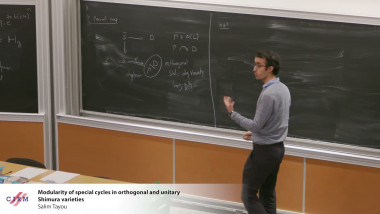![[1245] Model theory, differential algebra and functional transcendence](/media/cache/video_light/uploads/video/SeminaireBourbaki.jpg)
[1245] Model theory, differential algebra and functional transcendence
By Amador Martin-Pizarro

Modularity of special cycles in orthogonal and unitary Shimura varieties
By Salim Tayou
Appears in collection : Model theory of valued fields / Théorie des modèles des corps valués
Skeletons are subsets of non-archimedean spaces (in the sense of Berkovich) that inherit from the ambiant space a natural PL (piecewise-linear) structure, and if $S$ is such a skeleton, for every invertible holomorphic function $f$ defined in a neighborhood of $S$, the restriction of $\log |f|$ to $S$ is $\mathrm{PL}$.In this talk, I will present a joint work with E. Hrushovski, F. Loeser and J. Ye in which we consider an irreducible algebraic variety $X$ over an algebraically closed, non-trivially valued and complete non-archimedean field $k$, and a skeleton $S$ of the analytification of $X$ defined using only algebraic functions, and consisting of Zariski-generic points. If $f$ is a non-zero rational function on $X$ then $\log |f|$ indices a $\mathrm{PL}$ function on $S$, and if we denote by $E$ the group of all $\mathrm{PL}$ functions on $S$ that are of this form, we prove the following finiteness result on the group $E$ : it is stable under min and max, and there exist finitely many non-zero rational functions $f_1, \ldots, f_m$ on $X$ such that $E$ is generated, as a group equipped with min and max operators, by the $\log \left|f_i\right|$ and the constants $|a|$ for a in $k^²$. Our proof makes a crucial use of Hrushovski-Loesers theory of stable completions, which are model-theoretic avatars of Berkovich spaces.
